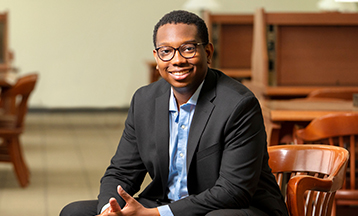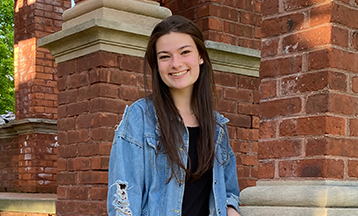-
About
Marist College to Become Marist University
University designation reflects breadth of global opportunities and bold vision for Marist's next century.
About
-
Academics
Marist College to Become Marist University
University designation reflects breadth of global opportunities and bold vision for Marist's next century.
Academics
-
Admission & Financial Aid
Marist College to Become Marist University
University designation reflects breadth of global opportunities and bold vision for Marist's next century.
Admission & Financial Aid
-
Student Life
Marist College to Become Marist University
University designation reflects breadth of global opportunities and bold vision for Marist's next century.
Student Life
- Athletics
image of students at research fair

Shanaaz Mohammed
TrinidadAcademic School
Liberal ArtsCampus
New YorkShanaaz Mohammed, PhD- Liberal Arts (French), using AI to support language learning
Abstract: Originally from Trinidad, Dr. Mohammed, an assistant professor of French at Marist College, brings a unique perspective to language teaching. Inspired by her diverse experiences, she enjoys introducing students to new ways of understanding French and Francophone culture. Building on her ongoing exploration of classroom technology, she uses AI to gamify and personalize her students’ language learning experiences. She views tools like ChatGPT as an opportunity for new engagement and looks forward to future AI developments that further support language learning.
Give me a little background about yourself – what do you teach, what inspired you to pursue this path?
I am an assistant professor and French program coordinator at Marist. I teach all levels of French language, literature, and culture courses. I first started studying French in high school in Trinidad, where I am from, and I was immediately drawn to the language. While I don’t have a dramatic inspiration story, the encounters, experiences, and opportunities — including this position at Marist— that I have had thanks to my career in French have enriched me both personally and professionally. They continue to inspire me, and I hope to draw on them to introduce our students to innovative and exciting ways of using French so that they leave my classes with a more nuanced, enlarged understanding of the world and the role of French within it.
What has driven your interest in AI and how to use it in your field?
Integrating new technologies into my pedagogy has always interested me. Rather than seeing technology as a distraction, I consider it as a tool to engage students with course materials in a format that is familiar to them.
When AI became more prevalent with the public release of ChatGPT, exploring and integrating it felt like the natural next step in advancing my tech-enhanced teaching. AI can be useful to not only personalize language learning experiences, provide instant feedback but also streamline the lesson planning process and gamify the student experience. It can automate certain aspects of lesson planning, such as generating exercises and games, which allows me to focus more on delivering more creative and engaging content.
What excites you most about the potential of AI in your field?
It’s capacity to enhance current modes of teaching and learning. I am especially excited to see how AI-powered platforms will continue to evolve and create more tools for language educators and learners to facilitate the teaching and learning processes.
How are you making use of AI to enhance the process of teaching French?
In my classes, I emphasize grammar through culture, which can be especially challenging in lower-level courses due to students’ limited proficiency. However, with tools like ChatGPT, I can summarize articles on current events that would otherwise be too complex for beginners. With AI, francophone culture becomes accessible even to beginning learners without requiring too much extra effort on my part.
Could you provide an example of how AI has made a tangible difference in your classroom or research?
In one of my classes this semester, I have integrated AI tools to support students in improving their writing. We emphasize writing as a process, so students first draft their essays individually or in small groups in class. They then upload their drafts to an AI-based platform that provides instant feedback, tailored to a rubric I have customized specifically for the assignment. This allows students to receive immediate, targeted suggestions on areas such as grammar, structure, and clarity, which they use to revise their work. Although I have not yet conducted formal research on the impact of this approach, the initial feedback from students has been positive.
Why should the everyday person care about advancements in AI research related to language?
Language is more than just vocabulary and grammatical rules — it’s the key to understanding context, culture, and the nuances of human interaction. In today’s globalized world, where intercultural communication is increasingly important, caring about AI language advancements means investing in tools that could bridge cultural gaps, not just translate words or reinforce stereotypes. It’s about fostering richer, more nuanced interactions that contribute to a more connected and empathetic world.
Why is it important for language teachers to embrace AI in the classroom? How can it help with language nuances, like grammar, syntax, or pronunciation?
There are two key reasons to embrace AI in the language classroom. First, AI streamlines the lesson planning process and gives instructors the flexibility to create customized content that goes beyond the textbook with minimal effort and in a fraction of the time. Second, AI provides students with immediate, personalized feedback, which is crucial in language learning. Learning a language requires constant practice and corrections. However, instructors can’t always provide real-time, individual feedback for every student. AI bridges this gap by offering instant, tailored suggestions based on each student’s work.
What unique perspective do you bring to Marist?
I bring a focus on the intersection of language, culture, and professional development, which shapes both my teaching and curriculum design at Marist. Since joining Marist in Fall 2022, I have expanded course offerings to include classes on the Francophone Caribbean. In Spring 2024, I developed the Virtual Exchange Program (VExP), a collaborative initiative between the French program at Marist and the Education program at Université de la Réunion. In this program, second-year master’s students at Université de la Réunion, who are training to become French teachers, meet virtually with individual Marist students in two upper-level French courses. They work together on customized lessons related to language, literature, and culture that align with the themes of each course. The program was well-received by our students and will be running again next Spring.
What are some of the top ethical concerns regarding the use of AI that we should all be thinking about?
One major concern is the potential bias in AI algorithms, especially when it comes to language translation and cultural understanding. AI tools are only as good as the data they’re trained on, and there is always the risk of reinforcing stereotypes or overlooking the richness of human expression.
Why is it important for educational institutions like Marist to be involved in AI development? How should the institution be approaching it?
AI is here to stay, and educational institutions like Marist need to be at the forefront of its development to ensure that faculty, staff, and students are prepared for an AI-driven world. By actively engaging in AI research and its practical applications, Marist can equip students with the skills and critical thinking abilities necessary to leverage this technology.
Should AI be feared or embraced?
Both. AI developments are exciting and create new opportunities to rethink our approaches to teaching and learning. However, it is important to embrace AI cautiously. There are legitimate concerns regarding its limitations, ethical implications, and potential for misuse. We should approach AI as a tool that enhances human abilities rather than replace human interaction, critical thinking, and creativity. Cautious optimism is a good path forward — embracing AI while maintaining a strong focus on its ethical use and human-centered applications.
What about the future of AI excites you?
I am most excited about new tools that gamify the language learning experience through AI. It could make language learning more immersive and motivate students to engage with the material in new and exciting ways to improve proficiency and confidence in using the language.
Interview conducted by Trevor McCormick



